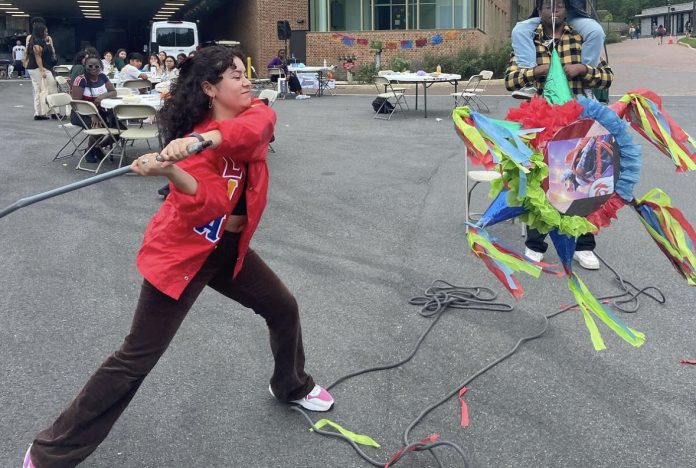The following article was previously published on The Flat Hat’s website. However, due to an unforeseen technological glitch, it was removed from the website for a period of time and was re-uploaded today, Nov. 6.
Saturday, Sept. 30, the College of William and Mary’s Center for Student Diversity, together with Hermandad de Sigma Iota Alpha and Political Latinxs United for Movement and Action in Society, hosted the College’s first ever Carne Asada. The event featured an array of traditional Latinx cuisine as well as lively music, creating a vibrant atmosphere for members of the Latinx community to celebrate and share their culture.
With a wide variety of freshly cooked foods to choose from, there was something to eat for everyone. From the grill came the titular carne asada dish, or marinated and grilled beef, along with chicken and vegetable fajitas. The event also featured Elote – a popular Mexican street food made by topping corn on the cob with mayonnaise, cheese and chili powder – refried beans, rice, and chips. The organizers also served desserts.
One attendee of the event, Hanna Pazo Vargas ’27, said that she was excited to get to eat the kinds of foods that she is accustomed to eating at home. Another attendee, Liyana Mohammed ’27, weighed in on the unifying impact of Carne Asada.
“I think food is such an important aspect to any community,” Mohammed said. “Carne asada is a very traditional Latin American and Hispanic food, so I feel like having events like these are important to bringing communities and clubs together.”
Carne Asada first emerged as the brainchild of Isabela Ortiz Caso ’25 as part of her work for the CSD. Each week, a student worker at the CSD organizes and hosts a campus event, and Caso explained how she wanted to plan one that was representative of her own cultural identity.
“I wanted to do something more tailored towards the Latinx community on campus, especially during Latinx heritage month,” Caso said.
Even though the work that went into bringing Carne Asada to life was stressful at times, Caso said that her job at the CSD prepared her well as she was familiar with organizing similar events for students at the College.
Beyond the CSD, Caso also serves as the arts and empowerment chair of PLUMAS, one of the Latinx organizations involved in Carne Asada. PLUMAS is a social justice group created at the College in 2021 and has a presence at various other universities in the U.S. Its mission is to uplift oppressed voices and advocate for minority rights both in the Latinx community and beyond.
“It’s definitely more so a voice for Latinx people to get into advocacy,” Caso said. “But also our mission is to foster a Latine community on campus since there’s not a lot of us.”
SIA, the other Latinx organization involved in Carne Asada, is a sorority that aims to foster sisterhood and academic excellence among women as well as spread awareness about the Latinx culture and community. SIA was originally founded in New York in 1990, and its Beta Delta chapter was brought to the College in 2013. Secretary and Recruitment Chairwoman for the College’s SIA chapter Angie Tellez-Sandoval ’25 said that SIA accomplishes its mission through community events as well as by educating others about issues impacting Latinx people. She pointed out how SIA also focuses on empowering a broad range of minority groups.
“We don’t always just focus on our own issues, but we like to uplift other voices as well,” Tellez-Sandoval said. “And that’s a big thing that we do because we understand that our marginalized identity intersects with so many others.”
In addition, Caso mentioned that SIA plans to host a stroll competition as an upcoming event. Strolling is a synchronized form of dance in a linear formation that draws influences from traditional Latino dances such as hip-hop, flamenco and salsa. She said that events like this help to show that multicultural sorority and fraternity life exists as an option for Latinx and first-generation students.
Events like these are important to ensuring that Latin American culture is represented and celebrated on campus, especially with a growing Latinx community at the College, Tellez-Sandoval explained.
“Let’s give it 10, 20 years ago, there’s maybe five Latinx people on this campus. We’re not visible, but we’re here,” Tellez-Sandoval said. “So we try to do these events … to share our culture, to share the beauty. It’s important because ultimately we’re not celebrated enough. Especially during our month, I want to make sure that our people know that we’re here, and I’m proud to see them here.”
Attendees and organizers also spoke about the importance of Latinx representation within a wider scope of the campus.
“I feel like every year I see more Latinx students, and it’s important to foster a community between them,” Caso said. “But also it can get really lonely not seeing or having your events hosted, not seeing your people, not seeing yourself represented.”
Caso also expressed her hopes that Carne Asada serves as a home stretch for Latinx students before fall break, in which they can feel a sense of cultural community and belonging. While this was the first year it has been held at the College, Caso says that she is hopeful Carne Asada might become an annual tradition during the month of September.

